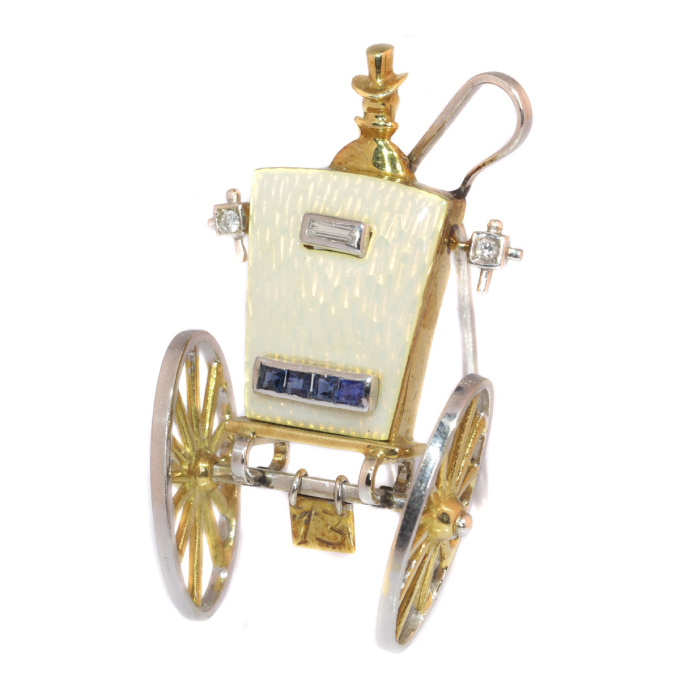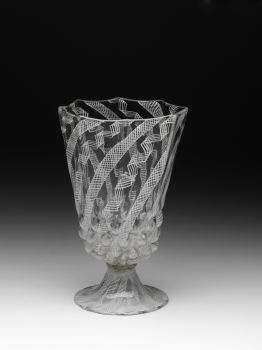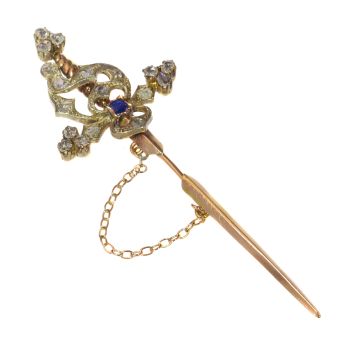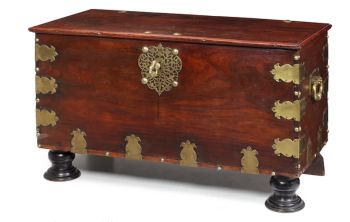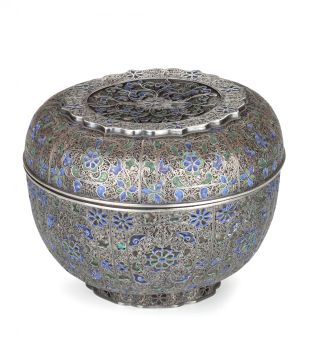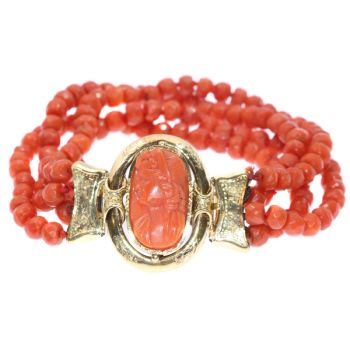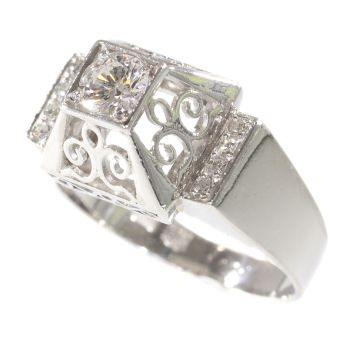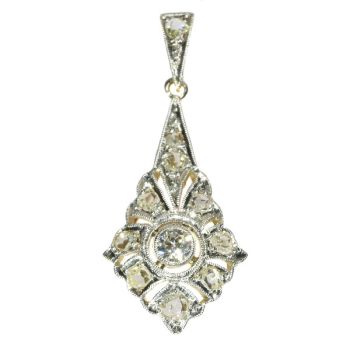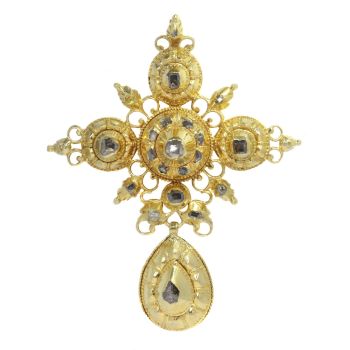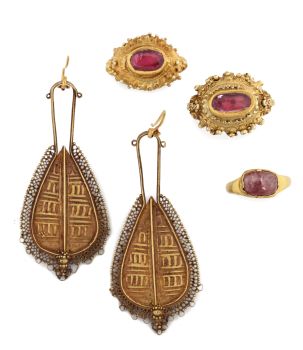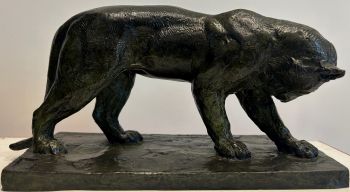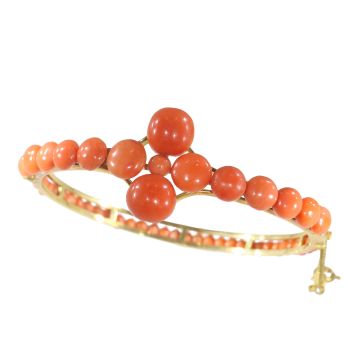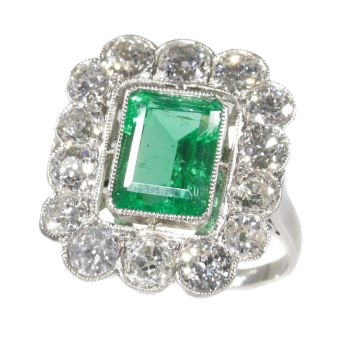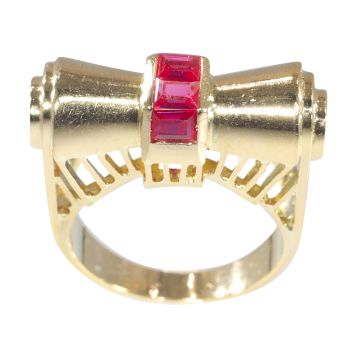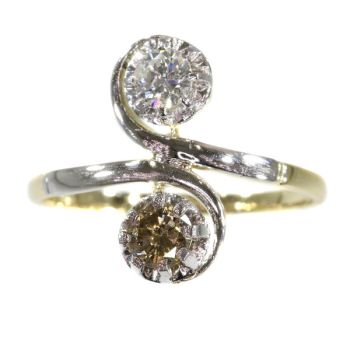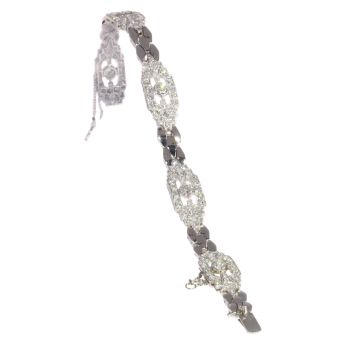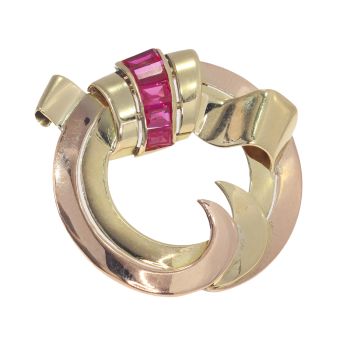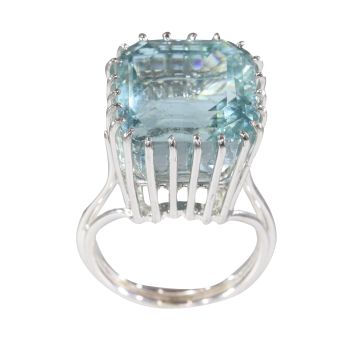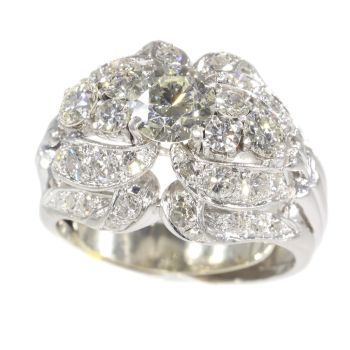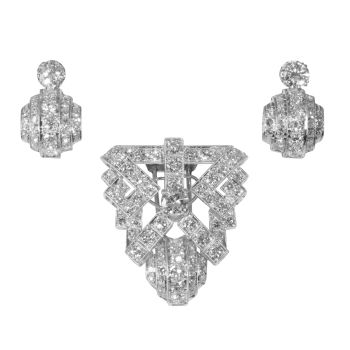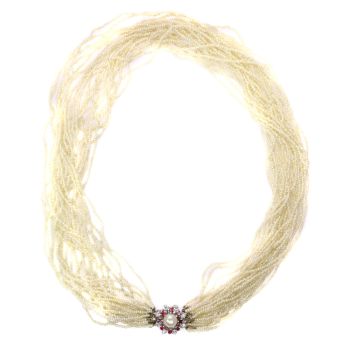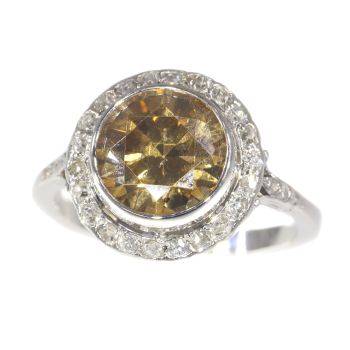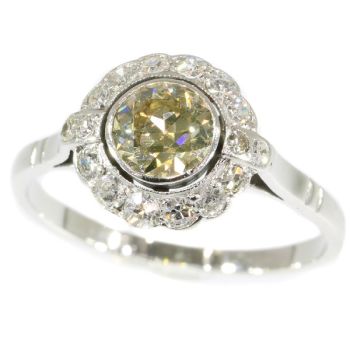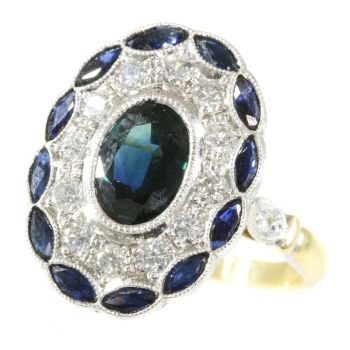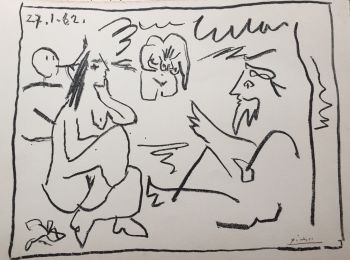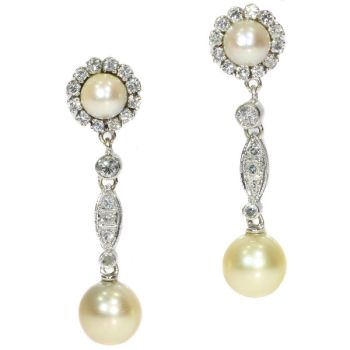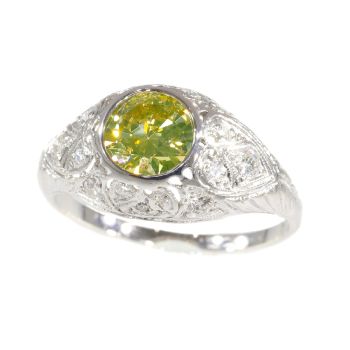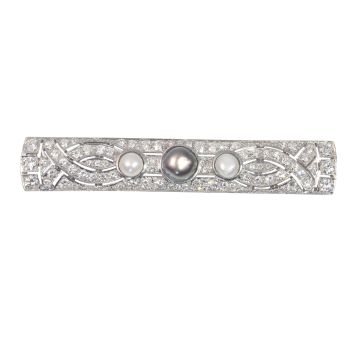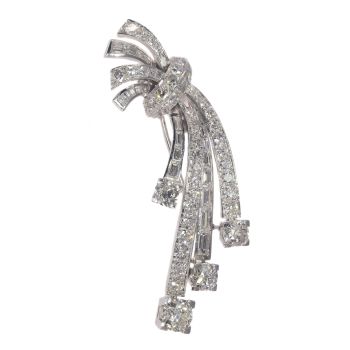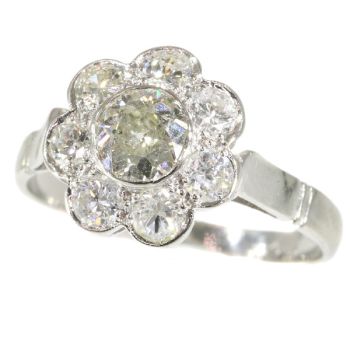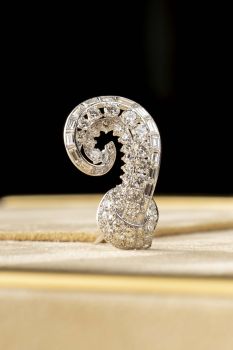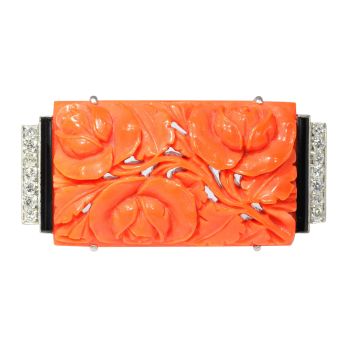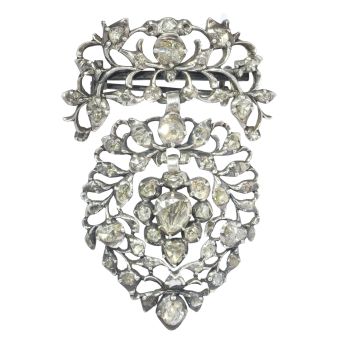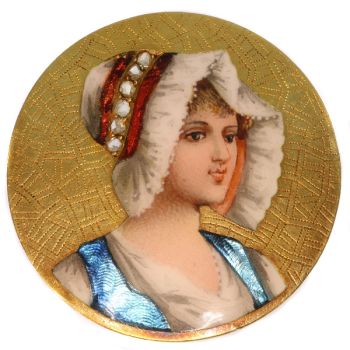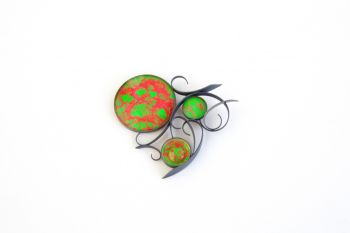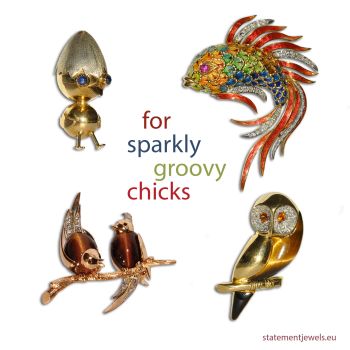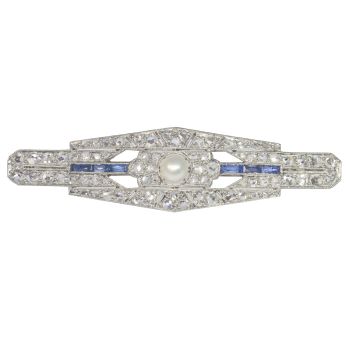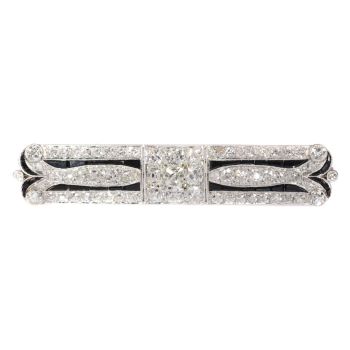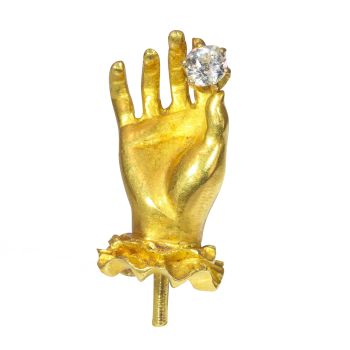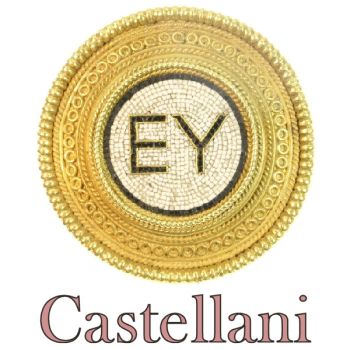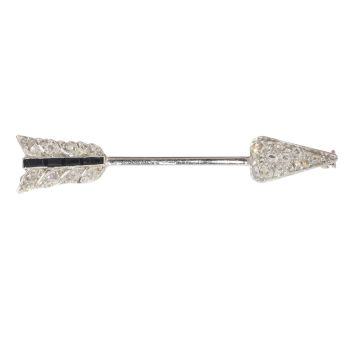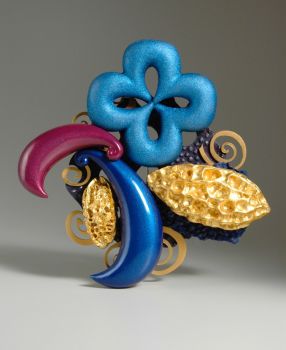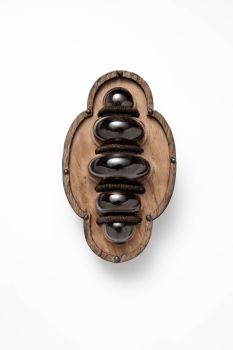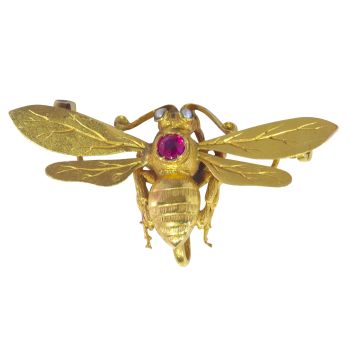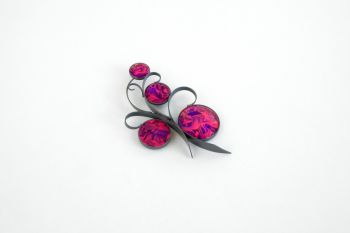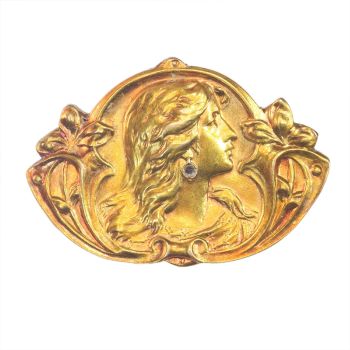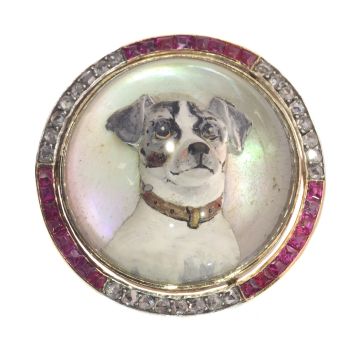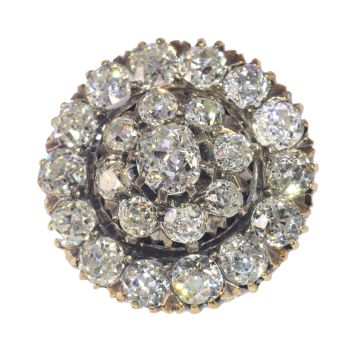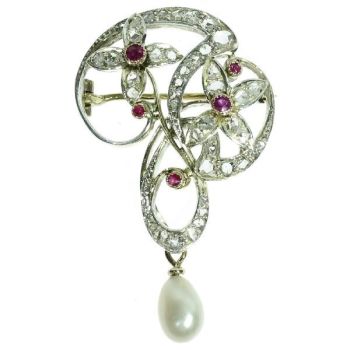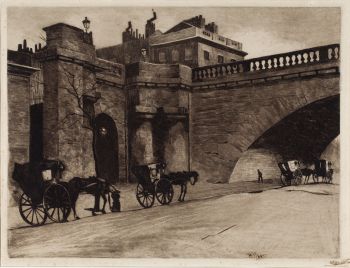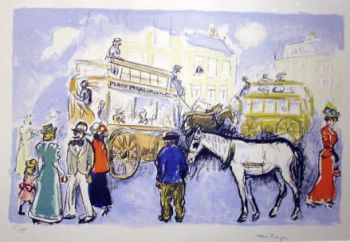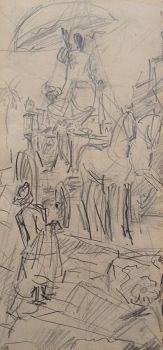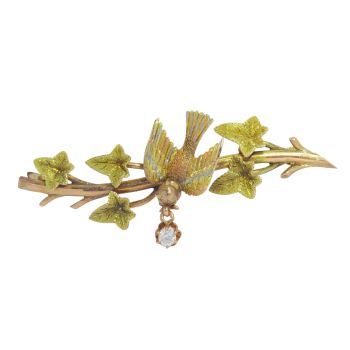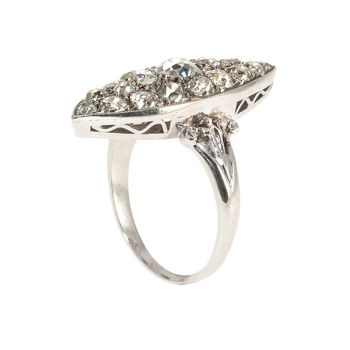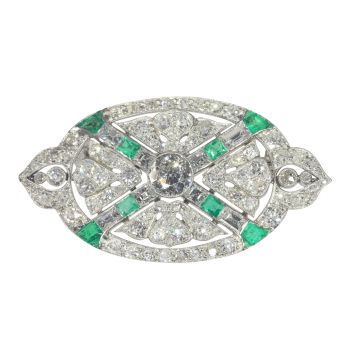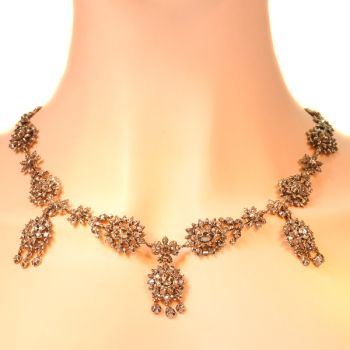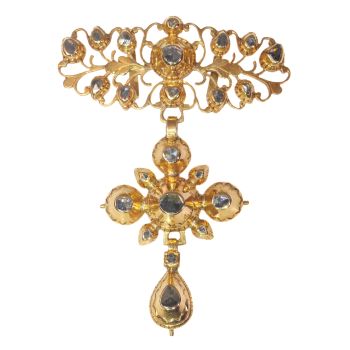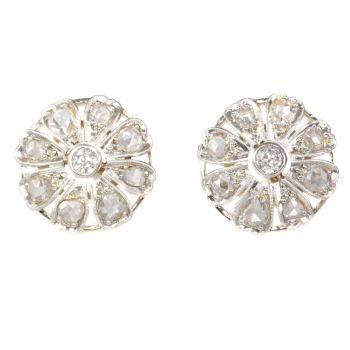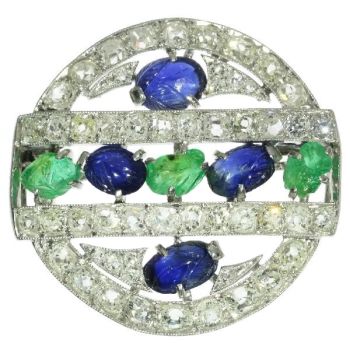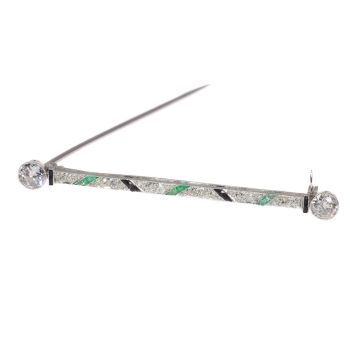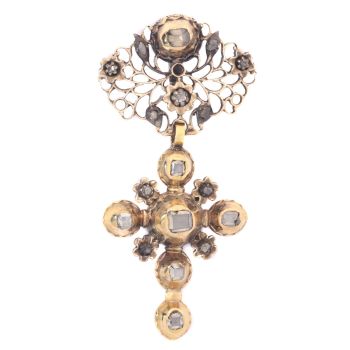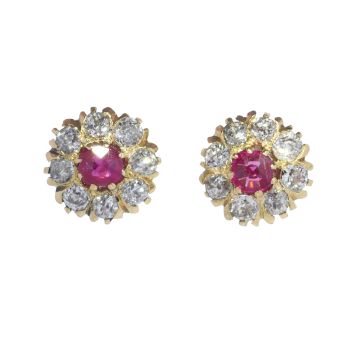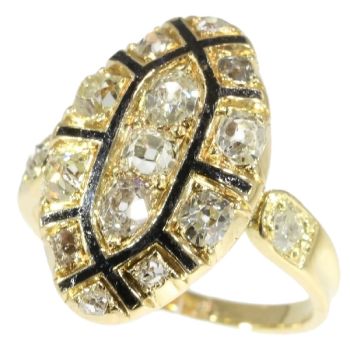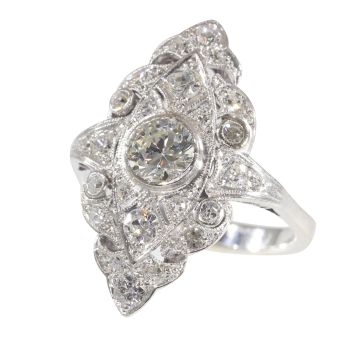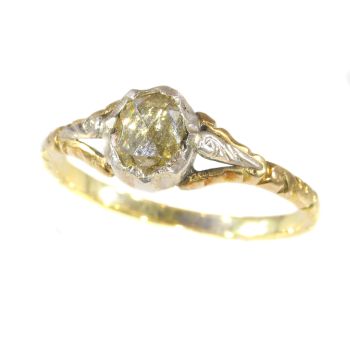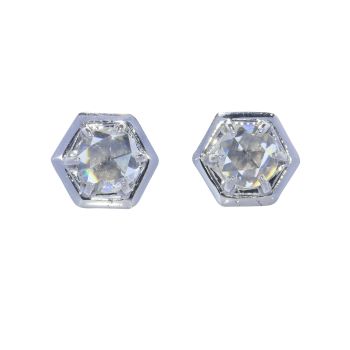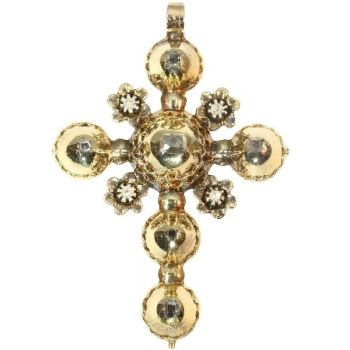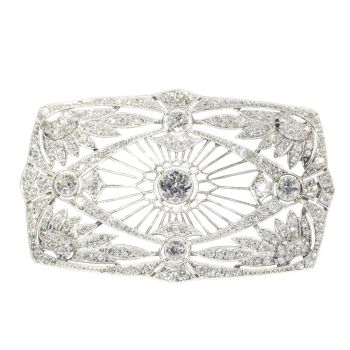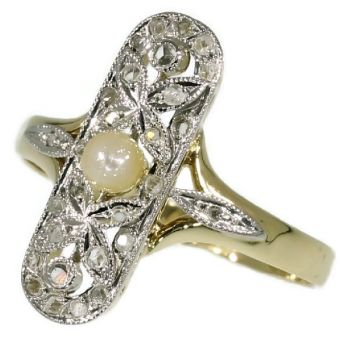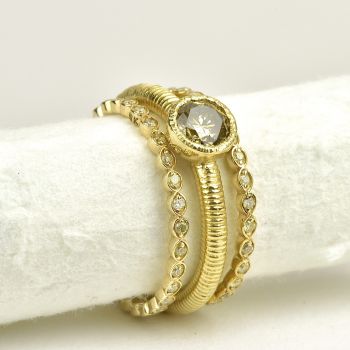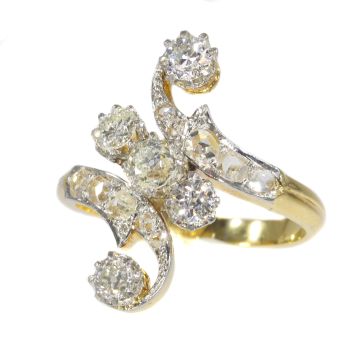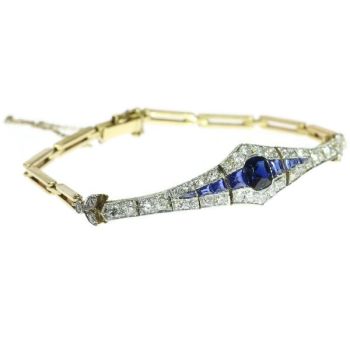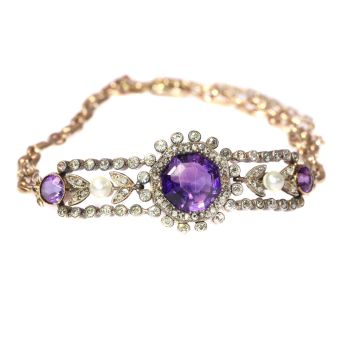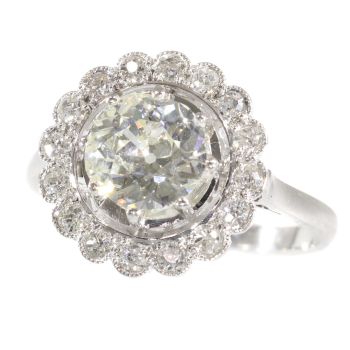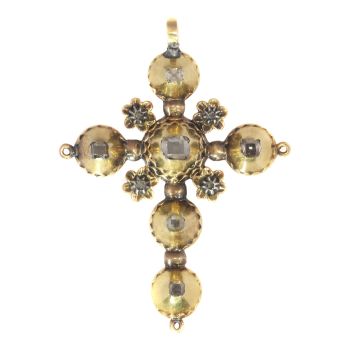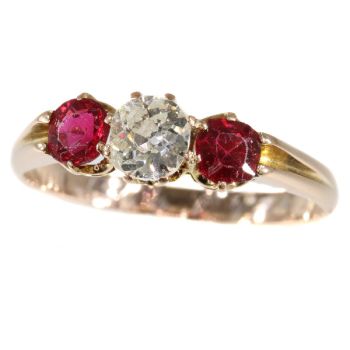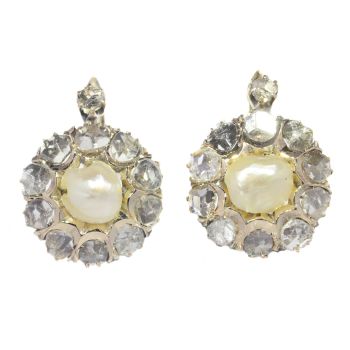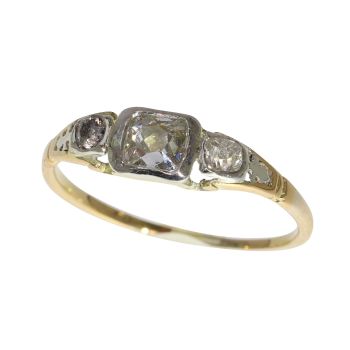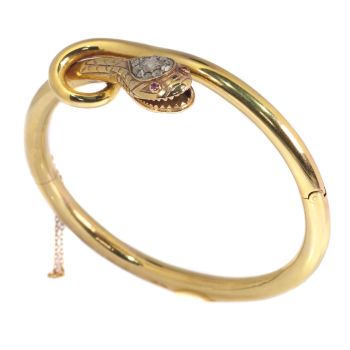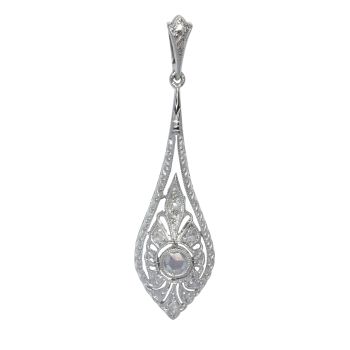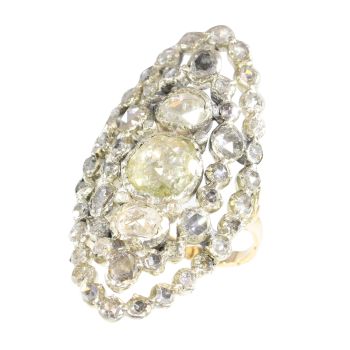Broche fantaisie en or carrosse typique du style Vintage des années 50 Mellerio 1950
Artiste Inconnu
Adin Fine Antique Jewellery
- Sur l'oeuvre d'art
Looking forward to whatever road lying ahead, this Italian Fifties 18K gold carriage built in Mellerio style has the ability to carry you to any gala you could ever imagine.
As your fairy godmother, Adin promises that the coach won't change into a pumpkin, so even after midnight you can count on these white gold wheels to take you away in this yellow gold frame with diamonds and sapphires embedded inwhimsical opaline enamel as the white gold lanterns light your path. However, the driver's got a mind of his own, being a former horse as you know.
Antique jewelry object group: brooch
Condition: very good condition
- (more info on our condition scale)
Country of origin: Italy
Style: Vintage Fifties (of the twentieth century)
- See also: Fifties (of the twentieth century)or more info on styles
Style specifics: This type of jewelry is very specific for the fifties of the twentieth century. All sorts of animals were used as source of inspiration for the goldsmiths. Made in gold and decorated with enamel and precious stones, the result of their labour most ofthe times well-made, clever and cute.
Period: ca. 1950
- (events & facts of this era, poetry of this era, fashion of this era)
Source of inspiration: Although this jewel is NOT signed Mellerio it has all characteristics of atypical Mellerio jewel. Even more, this model is typically a Mellerio model.
Theme: carriage
Material: 18K bi-color (yellow and white) gold
- (more info on precious metals)
Technique: Enamelling is an old and widely-adopted technology. The ancient Egyptians applied enamels to pottery and stone objects. The ancient Greeks, Celts, Russians, and Chinese also used enameling processes on metal objects. Enamel is the colorful result offusing powdered glass to a substrate by firing, usually between 750 and 850 degrees Celsius. The powder melts and flows and hardens to a smooth, durable vitreous coating on metal, glass or ceramic. According to some sources, the word enamel comes fromthe High German word smelzan (to smelt) via the Old French esmail. Used as a noun, "an enamel" is a usually small decorative object, coated with enamel coating, such as a champlevé or a cloisonné (different techniques).
Extra information: Mellerio - François Mellerio (1772-1843) created the foundations of the current house, MELLERIO dits MELLER. Set up at 4, rue du Coq-Saint-Honoré (today rue Marengo), his establisment rapidly grew under the Empire, thanks to Empress Josephine who bought small items from him and attracted in her wake the Emperor's family, the new nobility and the old aristocracy standing together. In 1815 at the end of the Empire, he transferred the house to 22, rue de la Paix and in the following year went intopartnership with his brother Jean-Jacques. Highly prized by the Orleans family, his most important customer, Mellerio was elevated, after the accession of the Duc d'Orléans to the throne in 1830, to the rank of official supplier to Queen Marie-Amélie,King Louis-Philippe and the royal family.
During the period of the economic crisis caused by the 1848 Revolution, the two brothers thought up the project of setting up an establissement in Spain, which was accomplished in 1850 with the opening of a shop in Madrid "Mellerio-Hermanos" whichrapidly received large orders from Queen Isabelle II and the grandees of Spain. The Second Empire was one of the finest periods for the Mellerio house in Paris. Worthy heirs of their forebears François (born in 1943) and Olivier (born in 1945) thecurrent managers are carrying on this high level of know-how, which warrants that the House is a member of the Comité Colbert and the High Jewelers of France.
(Check our glossary for more info on Mellerio)
Diamond(s): Two brilliant cut diamonds with an estimated weight of ± 0.02ct.
One baguette (long rectangular) cut diamond with an estimated weight of ± 0.03ct.
Total diamond count: Three pcs.
Total diamond weight: approx. 0.05 crt. with an average colour and clarity: F/H, vs/si.
- All diamond weights, color grades and clarity are approximate since stones are not removed from their mounts topreserve the integrity of the setting. Also we have all diamonds screened by the IJGC - lab (www.ijgc-worldwide.com) for whether they are natural or synthetic, and all diamonds in this jewel are 100% guaranteed to be natural!
Precious stones: Four sapphires. We did not check if the sapphires are lab produced or not as this information has no influence on the value of this jewel. Natural sapphires and lab produced sapphires were both used in this era, rather more for their effect than for their intrinsic value. with an estimated weight of ± 0.12ct.
- All color stone weights are approximate since stones are not removed from their mounts to preserve the integrity of the setting.
Birthstones: Diamond is the birthstone (or month stone) for April and sapphire for September.
- (more info on birthstones)
Hallmarks: "750" indicating 18K gold and "160AL" as master mark for Lunati in Allesandria, Italy
- (more info on hallmarks)
Dimensions: height 4,10 cm (1,61 inch)
Weight: 14,60 gram (9,39 dwt)
Reference Nº: 19220-0011
Copyright photography: Adin, fine antique jewelry
- Sur l'artiste
Il peut arriver qu'un artiste ou un créateur soit inconnu.
Certaines œuvres ne doivent pas être déterminées par qui elles sont faites ou elles sont faites par (un groupe d') artisans. Les exemples sont des statues de l'Antiquité, des meubles, des miroirs ou des signatures qui ne sont pas claires ou lisibles, mais aussi certaines œuvres ne sont pas signées du tout.
Vous pouvez également trouver la description suivante :
•"Attribué à …." A leur avis probablement une oeuvre de l'artiste, au moins en partie
•« Atelier de …. ou « Atelier de » À leur avis, une œuvre exécutée dans l'atelier ou l'atelier de l'artiste, éventuellement sous sa direction
•« Cercle de… ». A leur avis une oeuvre de la période de l'artiste témoignant de son influence, étroitement associée à l'artiste mais pas forcément son élève
•« Style de … ». ou "Suiveur de ...." Selon eux, une œuvre exécutée dans le style de l'artiste mais pas nécessairement par un élève ; peut être contemporain ou presque contemporain
•« Manière de… ». A leur avis une oeuvre dans le style de l'artiste mais d'une date plus tardive
•"Après …." A leur avis une copie (quelle qu'en soit la date) d'une oeuvre de l'artiste
•« Signé… », « Daté… ». ou « Inscrit » À leur avis, l'œuvre a été signée/datée/inscrite par l'artiste. L'ajout d'un point d'interrogation indique un élément de doute
• "Avec signature ….", "Avec date ….", "Avec inscription …." ou "Porte signature/date/inscription" à leur avis la signature/date/inscription a été ajoutée par quelqu'un d'autre que l'artiste
Êtes-vous intéressé par l'achat de cette oeuvre?
Artwork details
Related artworks
Onbekende Kunstenaar
Een zeldzame filigrana a retortoli bokaal1550 - 1600
Prijs op aanvraagPeter Korf de Gidts - Antiquairs
1 - 4 / 12- 1 - 4 / 24
Onbekende Kunstenaar
Antieke Saffier Broche sleutel1920
Prijs op aanvraagAnita Potters Juwelier Antiquair
1 - 4 / 24Willem Witsen
Wachtende rijtuigen voor de Waterloopbrug1850 - 1900
Prijs op aanvraagKunsthandel Pygmalion
1 - 3 / 3- 1 - 4 / 24
- 1 - 4 / 12

